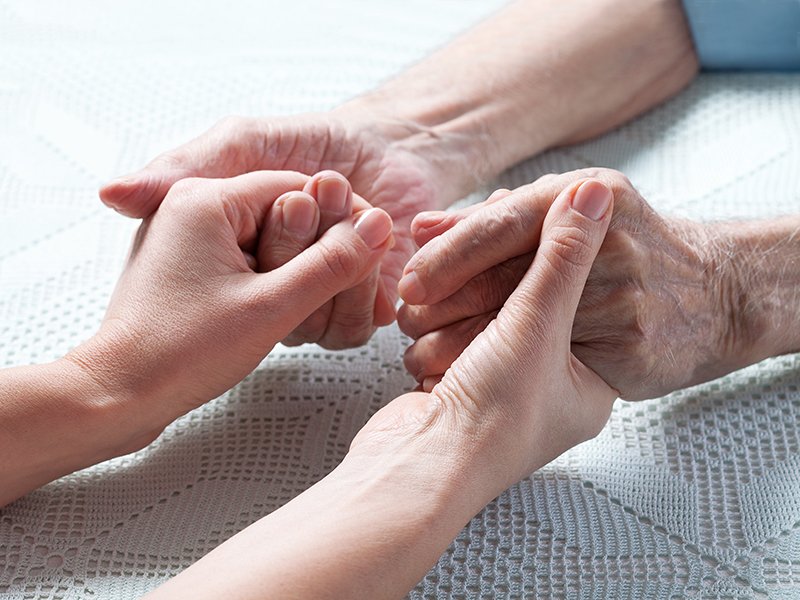
Do you know someone elderly—a friend, uncle, parent or maybe your spouse—who is demonstrating sadness, anxiety, changes in sleeping and eating patterns, general physical pain or disinterest in participating in regular life activities? The late-life years are often a fulfilling period, providing an opportunity to travel, explore new hobbies and spend time with family and friends. However, these years can also be a time of transition. Older adults often face retirement, medical illness, loss of independence, social isolation and the death of a spouse or other loved one.
Feeling sad or frustrated about such transitions is common. Although many older individuals feel better after a period of adjustment, others may have long-term difficulties coping and managing with these life events. There is a misconception that long-term effects from transitional events are a “normal” or “expected” part of aging, but they may actually be signs of depression that could affect quality of life. The good news is that if you spot depression, treatments are available.
It is particularly important for family and friends of older adults to be vigilant and to know what to look for. Many of us may be familiar with the typical signs of depression in a younger person—sadness, disinterest in once-pleasurable activities and changes in focus, sleep and appetite. While some of these same symptoms appear in depressed older adults, this population may also experience other symptoms. Instead of appearing sad, for example, they may appear restless, anxious or irritable. Older adults with depression may also experience general physical pain such as body aches that don’t have clear, identifiable causes or don’t improve as expected with standard treatment. Other symptoms may include fatigue or loss of memory. (If memory problems are depression related, they should improve when depression improves. If memory difficulties do not improve, then these may have a different cause.)
Getting Help
If you notice that an older adult in your life is isolating himself, appears more anxious than usual, shows less patience or more irritability or avoids talking and interacting with you, take the time to speak with him and communicate openly. Let this person know what you’ve observed and that you’re concerned. Ask about sleeping and if he is eating well. Let your loved one know that he could be experiencing depression and treatment for depression is available and often effective. You should suggest your loved one talk to his primary care doctor, who can provide treatment and may refer him to a mental health professional.
If your loved one is diagnosed with depression, the doctor may recommend one or more of the following treatment options:
Psychotherapy: Also known as “talk therapy,” it has been shown in older adults to be just as likely an effective first treatment for depression as taking an antidepressant medication. More specifically, cognitive behavioral therapy—which treats problems and boosts happiness by modifying dysfunctional emotions, behaviors and thoughts—has been shown to be an evidenced-based first line effective treatment.
Medication: If symptoms are moderate to severe and aren’t responding to other interventions, medication can be a very useful tool to treat symptoms.
Exercise: It stimulates the natural endorphins (a group of hormones that produce positive feelings and reduce pain) and promotes overall wellness and an improvement in mood.
Limiting or eliminating alcohol: This can help significantly, as alcohol is a depressant and it can lead to or worsen depression. As we age, the effects of alcohol become amplified because the liver does not break down alcohol as quickly. Alcohol also interferes with many medications.
A regular sleep schedule: Going to bed and rising at the same time every day (and eating a healthy, well-balanced diet) can help ease symptoms of depression.
Practices such as yoga, meditation and mindfulness: Evidence shows that these complementary therapies can ease depression, even creating biochemical changes in the brain. However, they should not replace talking with your doctor or continuing with a treatment plan already put in place.
Electroconvulsive Therapy: After 80 years of use, ECT is still the most effective and fastest-acting treatment for severe depression. Evaluation must be provided by a psychiatrist, and ECT may be explored as an option if a patient has not responded to several different medications. Generally, ECT is performed under anesthesia in a controlled outpatient setting up to three times a week for six to 12 treatments. Research shows that older adults tend to respond more quickly than others to ECT.
At any given time, an estimated 15 to 20 percent of older adults will experience depression. And as more Baby Boomers enter their golden years, we can expect the condition to affect an increasingly large number of the population. By knowing what to look for, you can help the older people in your life get the treatment they need.
To find out more about depression in older adults and other age-specific health issues, visit the National Institutes of Health’s senior health website.
Amit Patel, DO, is a psychiatrist with the Mid-Atlantic Permanente Medical Group. He completed his residency and fellowship at the University of Michigan and is board certified in both general and geriatric psychiatry. Dr. Patel has been named a top doctor in several local publications and sees patients at Kaiser Permanente’s Northwest D.C. medical office.




